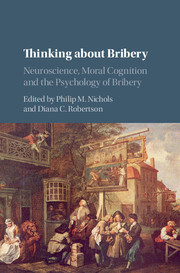Thinking about Bribery Neuroscience, Moral Cognition and the Psychology of Bribery
Langue : Anglais
Coordonnateurs : Nichols Philip M., Robertson Diana C.

This book explores the offer and acceptance of bribes, as well as the control of bribery, through sciences of the mind.
Bribery is perhaps the most visible and most frequently studied form of corruption. Very little research, however, examines the individual decision to offer or accept a bribe, or how understanding that decision can help to effectively control bribery. This book brings together research by scholars from a variety of disciplines studying the mind and morality, who use their research to explain how and why decisions regarding participation in bribery are made. It first examines bribery from the perspective of brain structure, then approaches the decision to engage in bribery from a cognitive perspective. It examines the psychological costs imposed on a person who engages in bribery, and studies societal and organizational norms and their impact on bribery. This is an ideal read for scholars and other interested persons studying business ethics, bribery and corruption, corruption control, and the applications of neuroscience in a business environment.
1. Introduction and overview: bribery and the study of decision making Diana C. Robertson and Philip M. Nichols; Part I. Structure and Mechanics of the Brain: 2. Cognitive neuroscience methods: an introductory overview for social scientists Trishala Parthasarathi and Joseph W. Kable; 3. The conforming brain and deontological resolve Melanie Pincus, Lisa LaViers, Michael J. Prietula and Gregory Berns; Part II. Moral Cognition and Bribery: 4. Corruption in the context of moral trade-offs James Dungan, Adam Waytz and Liane Young; 5. Cognitive dissonance, ethical behavior, and bribery Andrew Samuel; Part III. Psychological Insights into Bribery: 6. Beyond black and white: three decision frames of bribery Xiao-Xiao Liu, George I. Christopoulos and Ying-yi Hong; 7. Effect of reminders of personal sacrifice and suggested rationalizations on residents' self-reported willingness to accept gifts Sunita Sah and George Loewenstein; Part IV. Norms and the Decision to Engage in Bribery: 8. Determinants of corruption: a socio-psychological analysis Cristina Bicchieri and Deshani Ganegoda; 9. Moral norms, behavioral ethics, and bribery activity Robert A. Prentice; 10. Thoughts on the control of bribery Philip M. Nichols and Diana C. Robertson.
Philip Nichols is the Joseph Kolodny Professor of Social Responsibility in Business and Professor of Legal Studies and Business Ethics at the Wharton School, University of Pennsylvania. He also currently serves as the Co-Chair of the Anti-Corruption Law Interest Group of the American Society of International Law, and as the President of the Academy of Legal Studies in Business.
Diana C. Robertson is James T. Riady Professor of Legal Studies and Business Ethics at the Wharton School, University of Pennsylvania. Her research centres on business ethics and corporate social responsibility, and she has published numerous works in management science and business ethics.
Diana C. Robertson is James T. Riady Professor of Legal Studies and Business Ethics at the Wharton School, University of Pennsylvania. Her research centres on business ethics and corporate social responsibility, and she has published numerous works in management science and business ethics.
Date de parution : 09-2017
Ouvrage de 284 p.
15.6x23.5 cm
Disponible chez l'éditeur (délai d'approvisionnement : 14 jours).
Prix indicatif 45,81 €
Ajouter au panierThème de Thinking about Bribery :
© 2024 LAVOISIER S.A.S.



